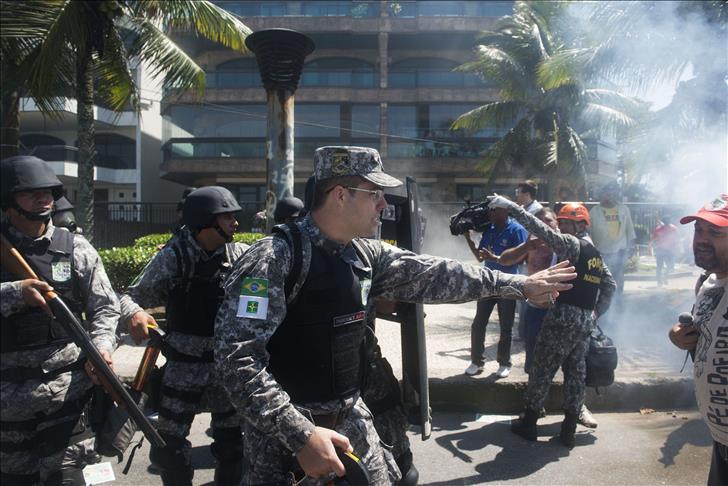Violence forces early start to Rio World Cup security
A World Cup security plan for Rio de Janeiro, which swells the number of police patrolling the city's streets to 2,000, has been brought forward after a spike in violence

by Ben Tavener
SAO PAULO
Security arrangements planned for the World Cup which set out to boost the number of military police patrolling the streets of the Brazilian city of Rio de Janeiro have been implemented ahead of schedule, as levels of violence in the city continue to rise.
Some 2,000 military police will patrol the city's streets from Monday, Rio's Secretary of Public Security told the Anadolu Agency, but declined to elaborate as to where police efforts would be focused.
The plan was meant to be brought in for the World Cup but has been implemented early due to the increased violent crime and to give police time to create the necessary deterrent ahead of the influx of visitors.
Rio is hosting seven fixtures of the key football tournament, which begins in just 38 days' time, including the final in the city's famous Maracanã stadium. Some 600,000 foreign visitors are expected to descend on Brazil for the event.
Rio Secretary of Public Security José Beltrame told reporters Monday that a gradual increase in crime had been witnessed since the end of 2013 and that the police presence in the city was being ramped up to deter criminals.
"I'm putting practically all the police on the streets, bringing forward what I was going to do at the World Cup as a police deterrent,” Beltrame was quoted as saying by news website UOL. “The step we're now taking is about reducing our crime hotspots."
'Soaring levels of violence'
The news is coincident with new figures from Rio's local Institution of Public Security, which showed murders were up 23.6 percent in March year-over-year, with 508 cases.
The institute's findings also showed that robberies targeting restaurants and other businesses had increased 85 percent in the first three months of 2014, and that street muggings were up 43 percent.
The figures suggest crime has returned to levels seen in 2008, when the state began implementing its policy of pacification, forcibly retaking shantytowns controlled by drug-trafficking criminals.
Rio photographer Nicson Olivier told the Anadolu Agency that more police could be seen in Rio's South Zone, home to the upmarket neighborhoods most popular with tourists:
“There has been a noticeable increase in police numbers in Leblon, Ipanema and Copabacana today since the morning,” he told the Anadolu Agency.
Residents in other areas of Rio told AA they had yet to see evidence of the increase, and local media reports that many residents in Rio remain skeptical at the news of more police on the streets.
Bigger issues
Stone Korshak, editor of The Rio Times news outlet, lives in Ipanema and said street crime in the area had soared in the last six months and that several of his acquaintances had been robbed at gun- or knifepoint in the neighborhood, which was previously considered relatively safe:
“The more police on the streets the better, as long as they are well-trained and deterring crime,” he told AA. “But long term Rio has to deal with the crippling poverty that keeps over a fifth of the population living in favelas without decent education, job training and livable wages.”
Trust between local residents and police officers is minimal, correspondents say, and has taken a further hit recently after high-profile cases of alleged police abuse.
They include: murdered dancer Douglas Rafael da Silva Pereira; housewife Cláudia da Silva Ferreira, who was dragged dying behind a police car; and most notably that of bricklayer Amarildo Dias de Souza whose disappearance in 2013 sparked violent protests.
englishnews@aa.com.tr
Anadolu Agency website contains only a portion of the news stories offered to subscribers in the AA News Broadcasting System (HAS), and in summarized form. Please contact us for subscription options.

